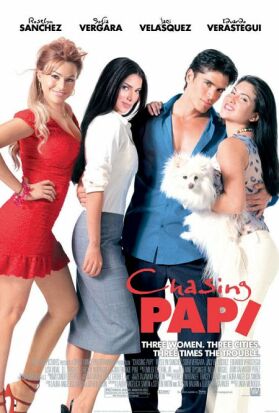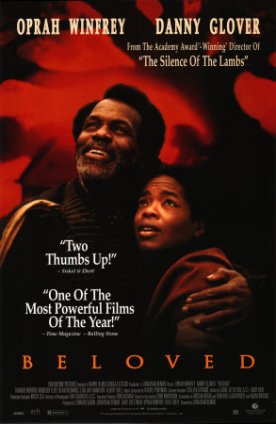Chasing Papi
Chasing Papi, directed by Linda Mendoza, is the story of a supposedly madcap adventure by three woman who meet and discover that they are all in love with the same three-timing man. It is supposed to herald a new wave of comedies in English featuring all-Hispanic casts and solidly grounded in one or more of the Hispanic subcultures of the U.S. If so, I hope that the ones to come are funnier than this one, which may have Puerto Ricans, Cubans and Mexican-Americans rolling in the aisles but seemed to me utterly devoid of funny lines, funny characters or funny moments.
Even worse, though Ms Mendoza is said to have turned down the chance to direct last year’s Real Women Have Curves, she has reproduced that film’s highly moralistic ethnic feminism which is designed to persuade Latina women that they are better off imitating the Anglo feminists of the dominant culture than allowing their native interest in men and marriage to have free rein. This idea was more or less built into the film from the beginning. “When a Latin man cheats on a woman, she doesn’t go after the man, she goes after the hootchie mama,” one of the Fox executives behind the film told the Washington Post. “It’s a revolutionary idea for Latino women — or so we’re told — for the women to be friends and the man to be the jerk.”
Except that the revolution, because it resembles every other Hollywood revolution by taking off from the decoupling of sex from love and commitment, requires that the man not be a jerk. After all, the point is for the women to learn to be more like him. Thus the “jerk” in this story, Tomás Fuentes or “Papi Chulo” (Eduardo Verástegui), explains his treachery by saying: “I love all three. Like Neruda: I love in this way because I don’t know any other way of loving.” As a philosopher of what the movies call “love” these days, the Communist Pablo Neruda has one of the top pedigrees, and is a Hispanic to boot.
The proto-feminists whose consciousness is raised by the cad are excused, it’s true, the Birkenstocks and other hippie-accoutrements of their more intellectual role-models. Patricia (Jaci Velasquez), a rich girl from New York, Lorena (Roselyn Sanchez), a book-loving lawyer from Chicago, and Cici (Sofia Vergara) a cocktail waitress and hopeful dancer from Miami, are all terrifically sexy, and they are allowed to wear clothes and make-up accordingly. Nor are they expected to eschew dancing, singing, pop music, beauty contests or (presumably) casual sex. But they have to learn that self-fulfilment depends, as it does for every self-respecting woman, on freeing themselves from the vulgar illusion that they need a man.
Meanwhile, the man whom each of them believes is in love with her, Tomás, is let off the hook for his treachery and deceitfulness. Lorena proposes that the girls agree “as honorable women” that none of them will any more have anything to do with Tomás, but each of them separately sneaks back to the house after she thinks the others have gone. Tomás then knocks himself out with booze and tranquilizers, and the three of them must cooperate to get him to a hotel, for some reason, to pose as a beauty contestant and her entourage and to evade a couple of incompetent crooks who are being pursued by the FBI — led, as it happens, by another Hispanic woman, Carmen (Lisa Vidal).
The humor of all this is even more exiguous than it sounds, but the sisterhood thus engendered allows the three girls to see the light and reject Tomás, after he wakes up. He takes off with Carmen, and five months later the girls are shown in exotic locations excitedly sharing by cell phone the details of their severally fabulous but apparently solitary lives. See gals? You don’t need a man, except maybe to amuse yourselves from time to time. You don’t need anybody. It may even be true. But it surely must take a strange sort of personality to enjoy, if anybody does enjoy them, such dull assurances of such a sterile truth.
Discover more from James Bowman
Subscribe to get the latest posts to your email.








